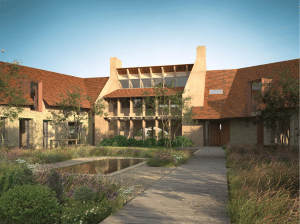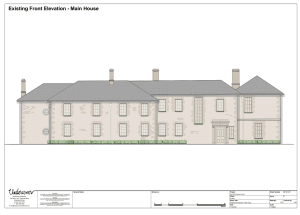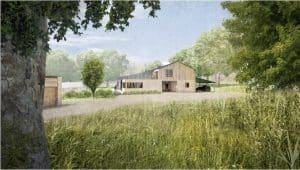McLoughlin Planning with special thanks to Undercover Architecture, who worked with us on this project and provided the drawings, are pleased to have gained planning permission and listed building consent for the Grade II listed private house, Somerford Keynes House, in the Cotswolds.
Listed building features required for consent
The key areas that the owner wanted consent for were:
- Erection of a porch extension and alterations to the main house.
- Various alterations to Kings Cottage, the Coach House and adjoining outbuildings, which are separately listed Grade II.
Contemporary Changes to the Main House
Alterations to the main house included in this recent granted permission were an addition of a French door with side lights to the side elevation, installation of rooflights in the roof valley between rafters (blocking up of a staircase to the basement with new staircase constructed to access cellar), and other minor workings such as the removal of modern partitions to allow for a more open plan space. In 2011, permission was granted for a stone porch to be added. This time round, a contemporary frameless glazed porch extension, complimented with a living green roof with pressed metal oversailing porch has been proposed to the side of the building to enhance a light and elegant feel to the house.
Family Orientated Outbuildings
In order for the outbuildings to have a more homely feel, internal changes were made to create larger spatial areas, including a raised ceiling, to accommodate for more bedrooms and a cosier setting at Kings Cottage. Proposed changes to the Coach House consist of a casement window to allow for an en-suit, which is located on the first floor to the linking section of the building. Originally, this wasn’t the case to be implemented, but due to concerns of excessive fenestration, the size of roof lights had to be changed and the dormer windows to be discarded. To allow for a modern way of travel and a tranquil Cotswold setting by the pool, an EV charging point and several air source heat pumps (ASHP), that are to be screened with timber for aesthetic purposes, were proposed.
Maintaining Historic Value and Consideration of Planning Policies
Overall, the proposed scheme has considered the historic value and beauty of the building’s original structure and the modern elements added to it over the years, therefore justifying that the new considered extensions and alterations granted for this permission will preserve the listed building for years to come. Additionally, careful considerations were sought out to ensure the development was aligned with legislation and policies, such as Section 16 of the NPPF (National Planning Policy Framework) for works to take place.
I’m a Listed Building Owner – When do I need to Acquire After Consent?
If you are a listed building owner and are wondering whether and/or when you need to acquire for listed building consent, please get in contact and one of our planning consultants will be able to assist. Additionally, please view our article here about when to acquire for listed building consent.
Joe Seymour – Associate Director
E: joe.seymour@mplanning.co.uk
T: 01242895008









